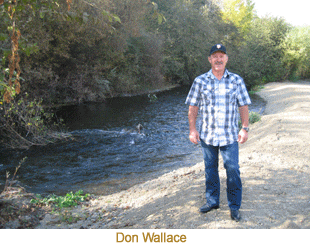Dry Creek Vineyard, an internationally renowned Sonoma County winery, is leading the way when it comes to great wines and sustainable development – and is a key partner in habitat restoration for endangered fish. Dry Creek Vineyard volunteered to be one of the first sites for a massive habitat enhancement project that is intended to restore endangered Coho Salmon as well as other Salmonoid species to the Russian River watershed. Construction of the Dry Creek Vineyard component of the project has been largely completed.
Dry Creek Vineyard is a family winery, founded in 1972 by David Stare and currently run by his daughter Kim Stare Wallace and her husband Don Wallace. “We are always looking into the future,” said Kim Stare Wallace. “Dry Creek Vineyard is committed to producing high quality wines, while keeping the land and resources affected by our operations in a state we will be proud to hand down to future generations.”
Over the past year, Dry Creek Vineyard’s dedication to sustainability has taken it on an uncharted journey to help restore endangered coho salmon and threatened steelhead trout to Dry Creek. The creek (the valley and vineyard’s namesake), borders the winery and delivers water from Lake Sonoma to the Russian River for flood control and water supply.
A federal mandate requires the Sonoma County Water Agency and U.S. Army Corps of Engineers to enhance six miles of habitat on the 14-mile Dry Creek, of which more than 90 percent is privately owned. Dry Creek Vineyard bravely stepped up to the plate, volunteering to be one of the first sites for a large-scale habitat enhancement project.
“The Sonoma County Water Agency worked closely with us to make sure that the project would benefit our land and provide an appropriate fish habitat,” said Don Wallace. “It was a leap of faith, but the benefits to our vineyards and our environment outweigh any potential concerns.”
“Thanks to Dry Creek Vineyard and their incredible neighbors, the first mile of habitat enhancement is off to a successful start,” said Mike McGuire, a Sonoma County Supervisor and member of the Sonoma County Water Agency Board of Directors. “We know that fish have already begun using the habitat enhancement features. This project would not be possible without landowners taking a chance on this innovative project.”
The Russian River Biological Opinion, issued in 2008 by the National Marine Fisheries Service, requires the Water Agency and Corps to construct six miles of enhancements by 2020. If the effort isn’t successful, the Biological Opinion requires the Sonoma County Water Agency to consider constructing a pipeline that would take much of the water out of Dry Creek in the summer.
Like many Dry Creek landowners, Dry Creek Vineyard views the creek itself as a vital summertime feature in the valley. “By helping make the project possible, we should be able to keep higher water flows in the creek year round, while still restoring coho, a keystone species in our watershed,” Wallace said. “The entire valley benefits, as do future generations.”
The Sonoma County Water Agency is working to secure our future by investing in our water resources, community and environment. The Water Agency provides water supply, flood protection and sanitation services for portions of Sonoma and Marin counties. For more information, visit their Web site: www.sonomacountywater.org.


